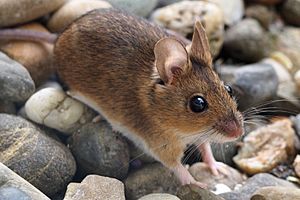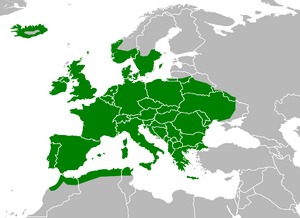Wood mouse facts for kids
Quick facts for kids Wood mouse |
|
|---|---|
 |
|
| Conservation status | |
| Scientific classification |
|
| Kingdom: | Animalia |
| Phylum: | Chordata |
| Class: | Mammalia |
| Order: | Rodentia |
| Family: | Muridae |
| Genus: | Apodemus |
| Species: |
A. sylvaticus
|
| Binomial name | |
| Apodemus sylvaticus (Linnaeus, 1758)
|
|
 |
|
| Apodemus sylvaticus range (in green) | |
| Script error: The function "autoWithCaption" does not exist. | |
| Synonyms | |
|
Mus sylvaticus Linnaeus, 1758 |
|
Script error: No such module "Check for conflicting parameters".
The wood mouse (Apodemus sylvaticus) is a common rodent. It is also known as the long-tailed field mouse or just field mouse. These small creatures are found across Europe and are well-known for their long tails and big ears.
Contents
What is a Wood Mouse?
The wood mouse is a type of mouse that lives in many parts of Europe. While many small mice are called "field mice," the wood mouse is the true field mouse in the UK. It is a very common animal.
Where Wood Mice Live
Wood mice are mostly active at night. They dig many tunnels and rooms underground. You can find them in woodlands, fields, and hedgerows. They also live in open grassy areas.
How Wood Mice Look
Wood mice have a solid brown coat on their back. Their belly is white. They have very large eyes and ears for their size. A full-grown wood mouse is about 10 centimeters (4 inches) long. It weighs around 30 grams (1 ounce).
What Wood Mice Eat
Wood mice are omnivorous. This means they eat both plants and animals. They enjoy a variety of foods like seeds, worms, berries, small insects, and even dead animals.
In forests, they eat acorns and sycamore seeds in winter. In spring, they munch on buds. During summer, they find insects and seeds. In autumn, they look for berries and fungi.
Who Hunts Wood Mice
Many animals hunt wood mice. These include owls and foxes. Because of this, wood mice usually live for only 6 to 12 months in the wild. However, if they are kept as pets, they can live for over 20 months.
Wood mice make their nests in warm, hidden places. They often nest underground. They will also use other warm spots where they can hide.
How Wood Mice Think
Wood mice are very smart. They often plan what they will do before they do it. They have tiny, sharp claws. They use these claws to dig into homes to find food.
They are good at judging if something is too risky or dangerous. They also often look out for each other. If a wood mouse is being chased, it will quickly dart into a hidden spot or a small crack.
History of Wood Mice
Scientists have studied how wood mice came to places like Shetland. Shetland is an island that is far away from other land. It has only a few types of mammals.
For a long time, people thought wood mice arrived with the Vikings around the 800s AD. But new discoveries show that wood mice were on Shetland much earlier. They were there during the Middle Iron Age, which was around 200 BC to 400 AD. Some scientists think they might have come from another island called Orkney.
Images for kids
-
Upper front teeth with a smooth inner surface. This helps tell a wood mouse from a house mouse.
-
A collection of cherry stones gathered by a wood mouse.
See also
 In Spanish: Ratón de campo para niños
In Spanish: Ratón de campo para niños






